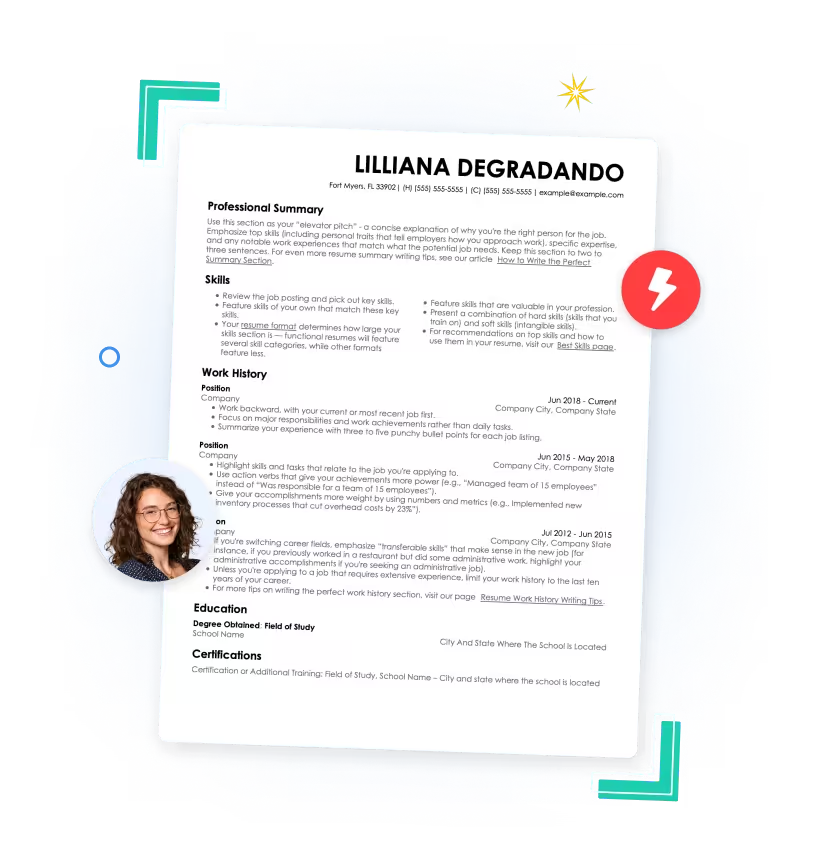How to Use These Resume Guides on Your Job Search
Navigating the workforce can be tricky, especially if you don’t consider yourself a great writer. Between resumes, cover letters, email, and other types of correspondence, knowing what will work and what won’t is critical.
Our resume writing guides will show you the way through the work search and the most delicate of workplace scenarios
Resume Guide: How to Make a Resume for a First Job
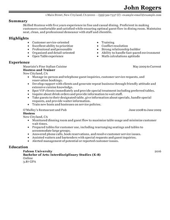
Our resume guide for making a resume for a first job can help you get your foot in the door! We’ve prepared these dos and don’ts to help:
 DO’s
DO’s- Include a skills summary
- Mention your recent work experience
- Use specific examples of how you made a difference
- Use bullet points to your demonstrate your experience and achievements
- Use creative designs with your bullet points
- Create an education section
- Format, format, format
- Focus on the top third of your resume















- Choose the wrong resume format
- Use a “Career Objectives” section
- Omit internships
- Forget to add volunteer work
- Skip adding data and metrics to your resume
- Be creative with section titles – stick to standard headers
- Include references
- Include your physical mailing address
Resume Guide: How to Mention Experience
in a Resume
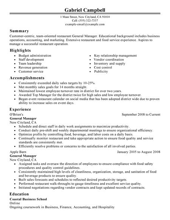

Knowing how to mention experience in a resume can help you get your foot in the door! Use the dos and don’ts we prepared in our resume guide for help:
BUILD MY RESUME















- Focus on experience in your summary statement
- Mention genuine skills based on experience
- Describe your unique work experience
- Describe your educational experience in a separate section
- Make it relevant with specific examples















- Waste the opportunity to show off in your Professional Summary
- Be afraid to repeat critical skills throughout
- Skip adding data and metrics to your resume
- Forget to personalize each resume to the job ad.
- Choose the wrong resume format
Resume Guide: How to Describe a Serving Job
on a Resume
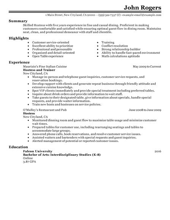

How you describe a service job on a resume is critical to getting an interview. Use these dos and don’ts in our resume guide to see how to get your point across:















- Demonstrate your understanding of the job’s requirement
- Use active words
- Provide real examples and successes to improve your resume
- Use short but specific details
- Know the importance of your previous experience
- Include the required resume sections
- Follow traditional resume formats
- Keep your resume’s appearance in mind while proofreading















- Forget to mention your customer service skills
- Don’t stay mum on your communication skills
- Use boring adjectives
- Exclude relevant experience
- Forget the metrics
- Skip the special training you have acquired
- Neglect to find the right resume format
- Forget to proofread
Resume Guide: How to List Awards on a Resume
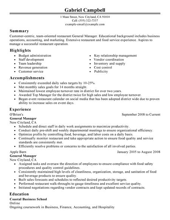

A prestigious award or recognition can elevate your resume to the top of the interesting pile. Use these do’s and don’t to make your expertise sing.















- Compile a relevant or impressive list of awards
- List your awards chronologically or by importance
- Be specific by using dates
- Mention the benefactor of your award
- List your awards near the bottom of your resume
- List the same award once, but differentiate with dates















- Don’t number your list
- Forget to add the title, date, and organization of each award
- Add duplicates of the same award
- Use an award that doesn’t relate to the job requirements
- Replace crucial resume sections like experience or skills – add a whole new award section
- List fictional awards
Resume Guide: How to Write Work Experience on a Resume
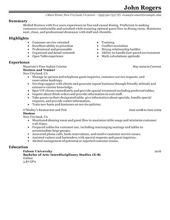

Our resume guide for how to write work experience on a resume can help you succeed in your job search. Use our list of dos and don’ts to increase your chances of getting an interview:















- Determine the needs of the position
- Rate your accomplishments
- Choose your words carefully
- Describe your work experience with skills and responsibility
- Only mention relevant work experience
- Proofread yourself, ask a friend to proofread – then proofread again















- Don’t be afraid to brainstorm
- Forgo the opportunity to write a great Professional Summary
- Be afraid to repeats critical skills in multiple sections
- Skip adding data and metrics to your resume
- Forget to add keywords from the job ad
- Choose the wrong resume format
Letter Guide: How to Create a Cover Letter
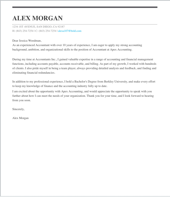

Our guide to how to create a cover letter can help you show recruiters how much you’ll bring to the table! We’ve prepared these dos and don’ts to help you express your most noteworthy work experience:















- Consider the job requirements
- Introduce yourself
- Demonstrate your understanding of the company ideas
- Explain your interest in role
- Describe your qualifications
- Make the case for yourself through examples
- Follow a coherent train of thought
- End with your contact information and availability















- Neglect keywords in the job ad
- Forget to research the company
- Skip presenting what you’ll add
- Assume an overly familiar tone.
- Forget to mention relevant skills.
- Neglect to expand on your resume
- Forgo connecting your skills to the job ad
- Skip copy editing – it’s crucial
Letter Guide: How to Start a Cover Letter
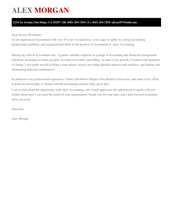

Our guide on how to start a cover letter can help you make a great first impression on recruiters! Our dos and don’ts can help you cover all your bases:















- Research best practices
- Describe your value
- Personalize the greeting
- Write a great opening line
- Introduce yourself and qualifications
- Include references Mention any referrals
- Continue with a warm, professional letter
- End your letter positively















- Use the same cover letter for every role
- Neglect to study the job ad’s keywords
- Write a generic salutation.
- Assume an overly familiar tone.
- Bury the lead – what makes you perfect for this role?
- Write about your needs
- Forget to use data to show your impact
- Skip copyediting
Letter Guide: How to Write a Cover Letter for
a Job Application
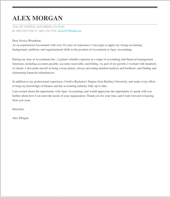

Do you know how to write a cover letter for a job application? Our resume guide can help! We’ve prepared these dos and don’ts to show you the way:















- Know your reader
- Do your research
- Showcase your qualifications
- Craft a compelling narrative
- Reuse keywords from the job ad
- Include your relevant skills
- Elaborate details from your resume
- End with an appropriate sign off















- Submit a generic cover letter
- Write a generic salutation.
- Assume an overly familiar tone.
- Neglect to study the job ad for keywords
- Be shy – what makes you perfect for this role?
- Make it about you – focus on the company’s needs
- Forget to use data and numbers
- Skip copyediting
Letter Guide: How to Write a Letter of Intent
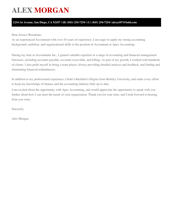

Letters of intent can be tricky but our guide to how to write a letter of intent can help! We’ve prepared these dos and don’ts to show you how:















- Do some background research
- Start with a personalized greeting
- Introduce yourself and your professional interest
- State your specific intent
- Explain your interest
- Share your proposed vision
- Demonstrate how you’re a good fit
- End with a strong close















- Skip your research
- Use a generic salutation
- Use an overly casual tone
- Forget to state the reason you are writing
- Neglect to mention what you have to offer
- Forgo mentioning soft skills
- Don’t skip adding data and numbers
- Be aggressive. Maintain a humble tone
Letter Guide: How to Write an Appeal Letter
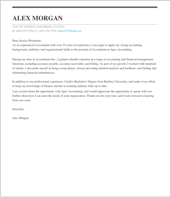

Confused about how to write an appeal letter? We can help you! We’ve prepared these dos and don’ts to help you find the right words:















- Be direct
- Share clear facts with evidence
- Retain a professional tone
- Claim responsibility for your mistakes
- Address your letter appropriately
- Be polite and patient















- Embellish – stick to the facts
- Play the blame game
- Don’t forget to use clear, concise language
- Don’t skimp on format
- Don’t forget to apologize
- Skip mentioning the value you add
Letter Guide: How to Write an Application Letter
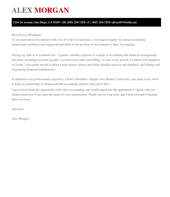

A great application letter can set you apart from the competition! We’ve prepared these dos and don’ts to help you make a great first impression:















- Do some in-depth research
- Find the correct addressee
- Include a strongly written introduction
- Demonstrate genuine excitement for the role
- Share relevant, new information
- Share valuable resources
- Start strong, end strong















- Forget to research the name of the hiring manager
- Skip adding a personal detail about the company
- Use a casual tone
- Forget to show your value
- Forget to add keywords from the job ad
- Forgo elaborating on your skills
- Forget data and metrics
- Submit a flawed resume – always proofread
Letter Guide: How to Write an Appointment Letter
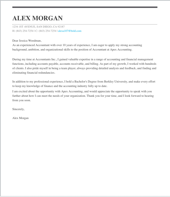

Our guide to on how to write an appointment letter can help you get your foot in the door! We’ve prepared these dos and don’ts to help you make a solid impression:















- Do some in-depth research
- Find the correct addressee
- Include a strongly written introduction
- Demonstrate genuine excitement for the role
- Share relevant, new information
- Share valuable resources
- Start strong, end strong















- Forget to research the name of the hiring manager
- Skip adding a personal detail about the company
- Use a casual tone
- Forget to show your value
- Forget to add keywords from the job ad
- Forgo elaborating on your skills
- Forget data and metrics
- Submit a flawed resume – always proofread
Letter Guide: How to Write an Apology Letter
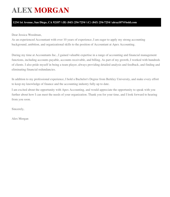

It’s hard to say you’re sorry and sometimes even harder to find the right words. Our guide to how to write an apology letter can help:















- Use the right greeting
- Explain why you’re writing the letter
- Start by addressing your mistake
- Display remorse and take full responsibility
- Acknowledge the negative effect of your actions
- Propose a potential solution
- Describe your future intentions
- Express your gratitude
- Remain sincere and respectful















- Write a generic salutation.
- Be bashful – explain why you are writing
- Play the blame game
- Minimize the impact of your mistake
- Forget to mention your plans to make amends
- Miss out on the chance to make peace
- Write in an overly familiar tone
- End your letter on a negative note
Letter Guide: How to Write a Resignation Letter
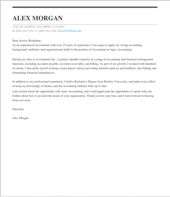

Saying goodbye isn’t easy but our guide to how to write a resignation letter can make it less painful! We’ve prepared these dos and don’ts to help:















- Be direct- go straight to the point
- Describe your gratitude
- Suggest potential candidates for your role
- Afterwards, be discreet
- Give an adequate time of notice
- Provide your personal contact information
- End on a positive note















- Leave the reader hanging
- Forget to be thankful say thank you for the opportunity
- Be disrespectful
- Leave without giving notice
- Be negative
- Forget to end your letter positively
- Be afraid to ask for references
Additional Resources
Entry Level Resume With No Experience
Find the Correct Letter and Resume Guide
- Resume Guides
- How to write work experience in a resume
- How to list awards on a resume
- How to write about experience in a resume
- How to describe a serving job on a resume
- How to make a resume for a first job
- Build your personalized resume
- Letter Guides
- How to start a cover letter
- How to write an appeal letter
- How to write a resignation letter
- How to write a letter of intent
- How to create a cover letter
- How to write an appointment letter
- How to write an apology letter
- How to write an application letter
- Build your personalized cover letter
